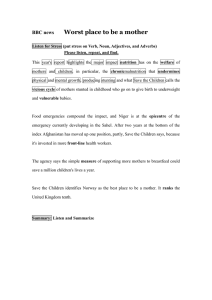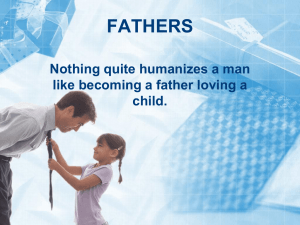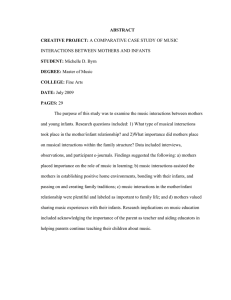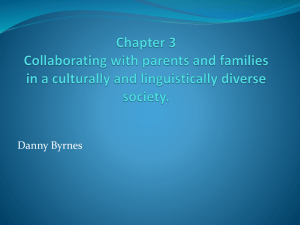Families, mothers and the Right to Peace
advertisement
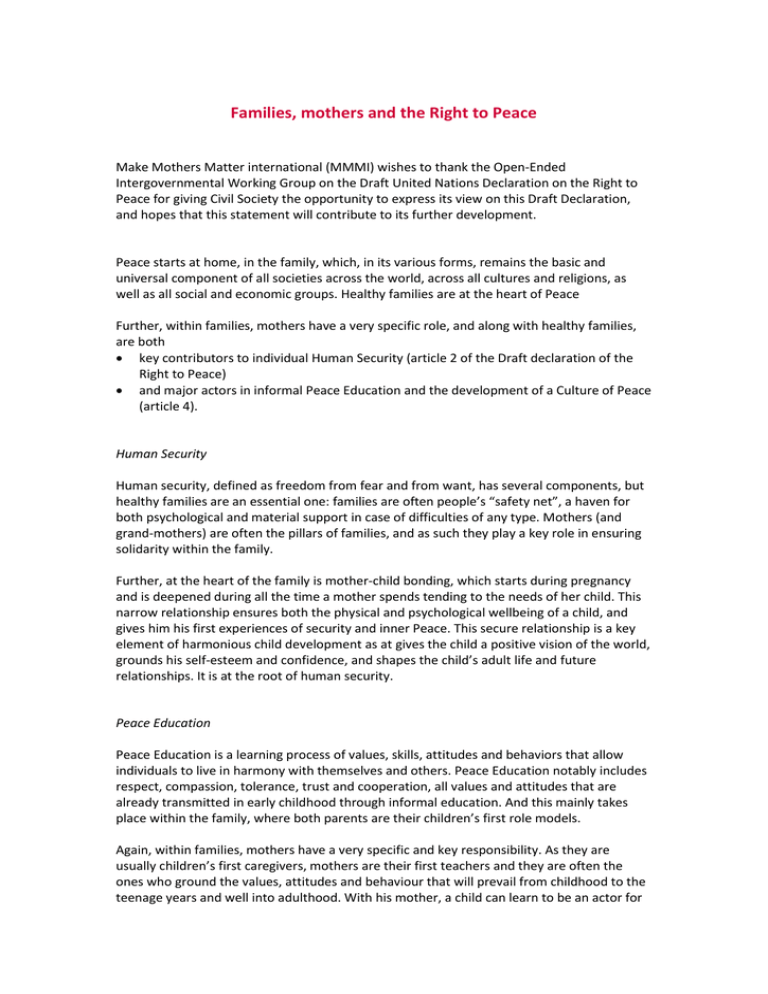
Families, mothers and the Right to Peace Make Mothers Matter international (MMMI) wishes to thank the Open-Ended Intergovernmental Working Group on the Draft United Nations Declaration on the Right to Peace for giving Civil Society the opportunity to express its view on this Draft Declaration, and hopes that this statement will contribute to its further development. Peace starts at home, in the family, which, in its various forms, remains the basic and universal component of all societies across the world, across all cultures and religions, as well as all social and economic groups. Healthy families are at the heart of Peace Further, within families, mothers have a very specific role, and along with healthy families, are both key contributors to individual Human Security (article 2 of the Draft declaration of the Right to Peace) and major actors in informal Peace Education and the development of a Culture of Peace (article 4). Human Security Human security, defined as freedom from fear and from want, has several components, but healthy families are an essential one: families are often people’s “safety net”, a haven for both psychological and material support in case of difficulties of any type. Mothers (and grand-mothers) are often the pillars of families, and as such they play a key role in ensuring solidarity within the family. Further, at the heart of the family is mother-child bonding, which starts during pregnancy and is deepened during all the time a mother spends tending to the needs of her child. This narrow relationship ensures both the physical and psychological wellbeing of a child, and gives him his first experiences of security and inner Peace. This secure relationship is a key element of harmonious child development as at gives the child a positive vision of the world, grounds his self-esteem and confidence, and shapes the child’s adult life and future relationships. It is at the root of human security. Peace Education Peace Education is a learning process of values, skills, attitudes and behaviors that allow individuals to live in harmony with themselves and others. Peace Education notably includes respect, compassion, tolerance, trust and cooperation, all values and attitudes that are already transmitted in early childhood through informal education. And this mainly takes place within the family, where both parents are their children’s first role models. Again, within families, mothers have a very specific and key responsibility. As they are usually children’s first caregivers, mothers are their first teachers and they are often the ones who ground the values, attitudes and behaviour that will prevail from childhood to the teenage years and well into adulthood. With his mother, a child can learn to be an actor for the wellbeing of the family, learning respect, solidarity, empathy, the value of caring for others, listening skills and the capacity to understand other peoples’ emotions. It is also within families that a child first learns about conflict resolution, with the mother often acting as a mediator. Culture of Peace Further, when caring for and raising their children, mothers develop many competences and skills that are at the heart of a Culture of Peace: they learn patience, selflessness, develop listening skills, respect and tolerance, as well negotiating skills (with their children & other family members). At the community level, mothers also quickly learn the value of social networking and supporting and helping each other. Further, maternity is universal and it is a bridge across ethnic, economic, social & cultural groups: as a result, mothers have the capacity to extend their "maternal embrace" well beyond their own children and community. These competences remain largely undervalued and underused. Mothers want the best for their children and are prepared to work hard and even take risk for the wellbeing of their family. They can be driven to action by a force often neglected by peace workers: their unconditional love for their children. Peace requires works, and mothers are ready to do it, from the kitchen table to the negotiation table. Violence in the family: an obstacle for Peace Indeed, peace cannot happen when violence, abuse or coercion occur within families: Domestic violence against women and children makes the family unsafe & unsecure for all its members, and perpetuate a culture of violence, with children understanding violence as the expression of masculinity. Similarly, such violence as harmful traditional practices, honour crimes or forced marriage are major obstacle to Peace, as they also perpetuate a culture of violence against women and girls. Addressing the root causes of domestic violence is working towards Peace. Similarly, ensuring equal rights between men and women, as well as equal participation in decisionmaking at every level, is a condition for Peace. Further, States responsibility to protect should extend into the private sphere of the family, as it is an essential component of human security. Families, mothers & the Right to Peace In today's societies, healthy families with strong mothers are a much needed stabilizing, strengthening and educative force. And when the family extends to the community and beyond, to the whole human family, we can live in a Culture of Peace. MMMI therefore suggests that the declaration on the Right to Peace recognizes the specific roles, competences and responsibilities healthy families, and mothers in particular, have for Human Security, informal Peace Education and the development of a Culture of Peace highlights the importance of developing policies that protect, support and empower healthy and violence-free families, based on equality between men and women, as the foundation of peaceful societies empowers mothers as actors for Peace.
